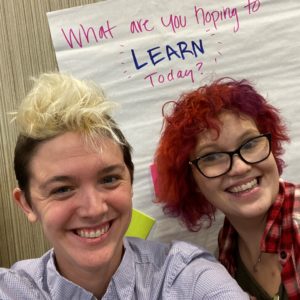At A Way Home Washington, our core values include equity, youth partnership, a data-driven culture and trauma-informed practice. Our Coaching and Improvement Manager, Ashley, writes about what youth partnership means at A Way Home Washington.
In the youth homelessness world, we know that we need the expertise of young people with lived experience to improve systems. Throughout my entire career, I’ve worked in spaces that seek to empower youth. In that time, I’ve seen my share of missteps when it comes to youth engagement, and I’ve seen what it takes to achieve positive youth engagement.
Some organizations operate under the premise that any access to leadership opportunities is good for young people, even when they haven’t had a say in shaping these opportunities. I’ve been shocked to see organizations lead Youth Advocacy Days with no policy agenda, much less one written by young people. In these instances, the opportunity to talk to state representatives is seen as benefit enough for young people.
On the other hand, I’ve also seen organizations gather input and recommendations from young people only to keep them out of project implementation. I remember one focus group where young people were invited to give their interpretation of a third-party dataset, and they spoke passionately on the topic. Afterwards, the facilitators never followed up with young people as they wrote a report based on their insights – a report that continues to be referenced nationally. I’ve seen this type of situation time and time again, where young people deliver important insights without their expertise being valued in the same way as that of older folks. They don’t get to own the ideas or products they’ve informed, and they’re not treated as partners in the work.
In a sector that’s committed to youth voice, choice and leadership, we can’t keep repeating these patterns. Young people with diverse experiences and identities must be involved in our work from idea to implementation. In these instances, young people can grow their skills, build connections and move toward stability, AND our systems improve through their involvement.
In the Anchor Community Initiative, we are working alongside young people and the community to re-imagine what co-creation means. Each Anchor Community team includes at least two young people with lived experience, and in the next phase of work we want to take youth partnership to the next level by:

1) Engaging a diverse group of young people. We’re building out youth engagement plans to make sure that multiple young people, with a diversity of experiences and identities, are involved in Anchor Community work.
2) Developing young people as co-leaders. We’re helping communities move beyond simply having youth representation on their teams, and into co-creating meeting agendas, co-facilitating meetings and having key roles in the implementation of improvement projects.
I am thankful that it’s becoming the norm in the youth homelessness world to include young people with lived experience in the creation of the systems that will impact their lives. It is heartening to see older folks invite young people to their meetings and initiatives. But we need to be clear that this is only the first step in our journey to co-creating solutions with young people.
When we work with young people, we need to let go of the expectation that they need to adapt to older folks’ way of doing things. Our workplace norms were created according to the dominant culture – that means they align to the preferences of men, white people, older adults and so on. If we’re serious about working in partnership with young people – and to end youth and young adult homelessness we have to be! – we need to co-create spaces so everyone can be a full, respected participant in the process.

Leave a Reply